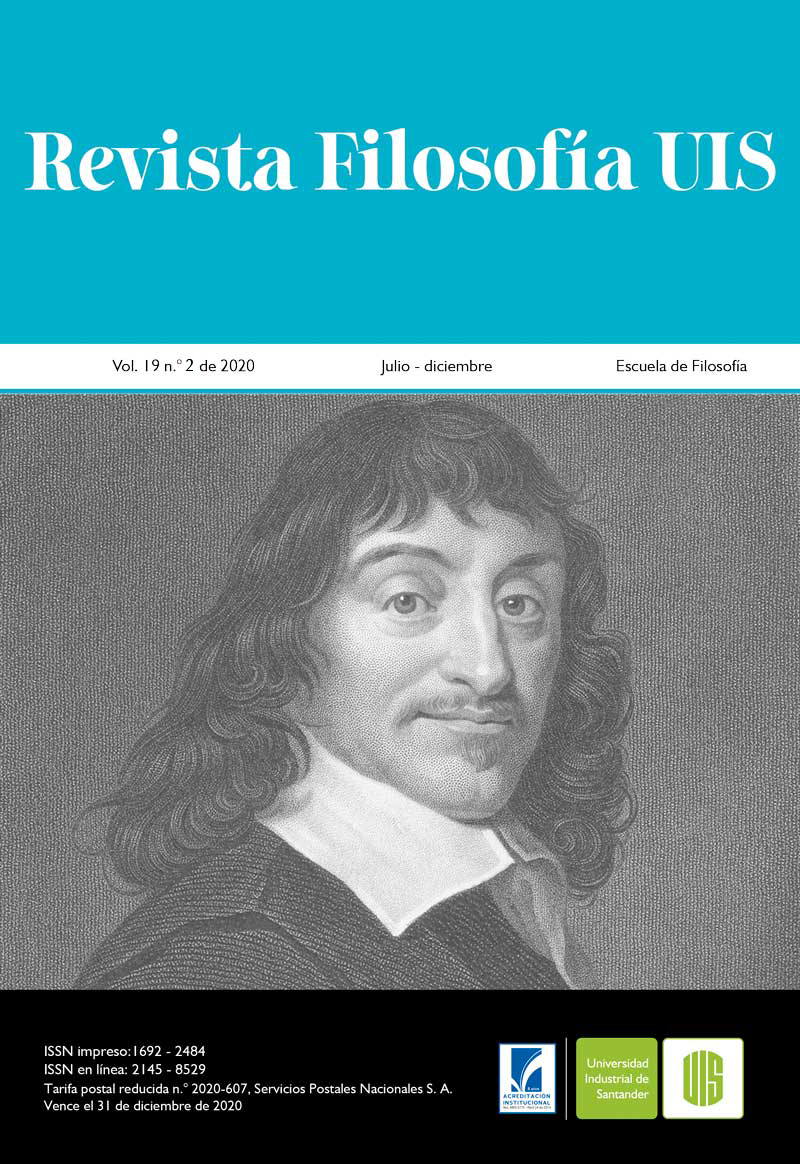From From Mechanical Rhetoric as Physiological Principle to the Economic Exploitation of the Body. Harvey, Descartes and the Disciplinary Paradigm in Michel Foucault
Published 2020-06-04
Keywords
- Body,
- Anatomical description,
- Medical intervention,
- Harvey,
- Descartes
- Res extensa,
- Disciplinary societies,
- Biopolitics,
- Foucault ...More
How to Cite
Copyright (c) 2020 Revista Filosofía UIS

This work is licensed under a Creative Commons Attribution 4.0 International License.
Abstract
The history of Modernity as thought as the victorious narrative of the human reason over any form of barbarism and superstition, cannot be properly framed regardless a certainly paradoxal assumption —that the definition of the soul its primarily founded on a problematization of the body. In this paper we examine some medical metaphors of the body from the perspective of the mechanical paradigm, such as a system of joints, gears, fluxes, circuits and so on, with its own inner logic moreover than according with the laws of the universe. The article sketches out an argument between William Harvey and Rene Descartes as seen as a key chapter for the history of the medicine as well as that of the mechanical philosophy. Likewise we follow-up some of Descartes' metaphysical assumptions which according to our reading will give birth to the disciplinary model in modern societies, as such as they’re analysed by Michel Foucault.
Downloads
References
Bitbol-Hespériès, A. (1998). La médecine et l’union dans la “Meditation sixième”. En Kolesnik-Antoine, D. (Ed.), Union et distintion de l’âme et du corps: Lectures de la vie: “Meditation” (pp. 18-36). Prefacio de P. F. Moreau. Kimé.
Canguilhem, G. (1955). La formation du concept du réflexe aux XVIIe et XVIIIe siècles. Presses Universitaires de France.
Canguilhem, G. (2000). La connaissance de la vie. Vrin.
Canguilhem, G. (2009). Lo normal y lo patológico. Siglo XXI Editores.
Derrida, J. (1977). Posiciones. (M. Arranz, trad.). Pre-textos.
Descartes, R. (1974a). Oeuvres de Descartes, I. Correspondance (Avril 1622-Février 1638). En C. Adam & P. Tannery. (Eds.). Vrin.
Descartes, R. (1974b). Oeuvres de Descartes, X. Physico-mathematica; Compendium musicae ; Regulae ad directionem ingenii ; Recherche de la verité ; Suplement de la correspondance. En C. Adam & P. Tannery. (Eds.). Vrin.
Descartes, R. (1980). Obras escogidas. (E. de Olazo y T. Zwanck, trads.). Editorial Charcas.
Descartes, R. (1986). Oeuvres de Descartes, XI. Le Monde ; Description du corps humain; Passions de l’âme; Anatomica; Varia. En C. Adam & P. Tannery. (Eds.). Vrin.
Descartes, R. (1987). Meditaciones metafísicas y otros textos. (E. López y M. Graña, trads.). Gredos.
Descartes, R. (1990). El tratado del hombre. En G. Quintás Alonso. (Ed.). Alianza Editorial.
Descartes, R. (1995). Los principios de la filosofía. En G. Quintás Alonso. (Ed.). Alianza Editorial.
Descartes, R. (2011). Discurso del método. [Estudio Preliminar]. (R. Frondizi, trad.). Alianza Editorial.
Foucault, M. (1989). Vigilar y castigar. Nacimiento de la prisión. Siglo XXI Editores.
Foucault, M. (1998). La voluntad de saber. Historia de la sexualidad I. (U. Guiñazú, trad.). Siglo XXI Editores.
Foucault, M. (2002). ¿Crisis de la medicina o crisis de la antimedicina? En J. Varela y F. Álvarez Uría. (Eds., trads.), La vida de los hombres infames (pp. 67-84). Altamira.
Foucault, M. (2012). El poder, una bestia magnífica. Sobre el poder, la prisión y la vida. En E. Castro. (Ed.). Siglo XXI Editores.
Gadamer, H.-G. (2012). El estado oculto de la salud. Gedisa.
González Recio, J. L. (1995). La paradoja Harvey-Descartes y el proyecto de una biología teórica. Thémata, 9(1), 61-82.
Harvey, W. (1956). The Heart is a Pump: The New Physiology. En The Portable Age of Reason Reader (pp. 314-318). The Viking Press.
Nancy, J.-L. (2007). Ego sum. Anthropos.
Negri, A. (2008). Descartes político. Akal.
Quintás Alonso, G. (1990). Introducción a Descartes, R. En El tratado del hombre (pp. 11-27). Alianza Editorial.
Sfez, L. (2008). La salud perfecta. Crítica de una nueva utopía. (P. Rodríguez, trad.). Prometeo.
Suárez, E. (2000), El organismo como máquina: Descartes y las explicaciones biológicas. En Descartes y la ciencia del siglo XXVII (pp. 138-159). Siglo XXI Editores.
Vesalius, A. (1998). On the Fabric of Human Body. Book I: The Bones and Cartilages. (De Humani Corporis Fabrica, W. F. Richardson & J. B. Carman, trads.). Norman Publishing.
Vigarello, G. (2006). Lo sano y lo malsano. Historia de las prácticas de la salud desde la Edad Media hasta nuestros días. (A. M. Amoretti, trad.). Abada.

